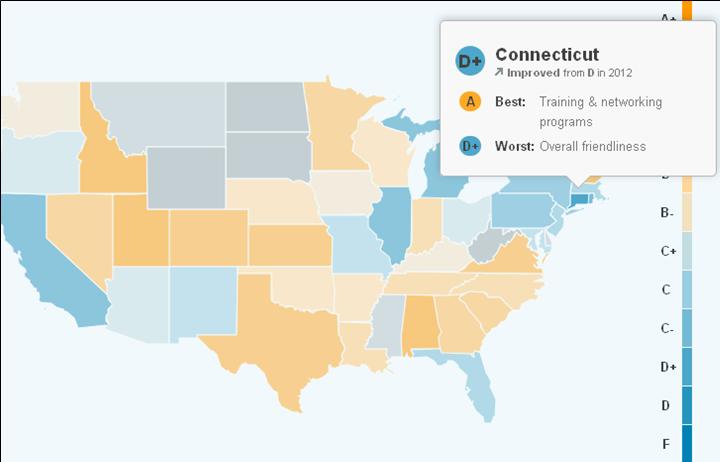Small Business Friendliness in CT Improved to D+ in 2013, Data Shows
/
Connecticut’s small business climate is improving – slowly. That’s according to the 2013 Small Business Friendliness Survey by Thumbtack.com, in partnership with the Ewing Marion Kauffman Foundation, which ranked the state #35 for overall small business friendliness.
The 2013 study draws upon data from over 7,000 small business owners nationwide and shows that Connecticut improved its overall grade slightly, rising from a 'D' in 2012 to a 'D+' in  this year's study.
this year's study.
Although the state struggled overall, the study authors reported, it received high marks in several categories. Some of the key findings for Connecticut include:
Connecticut earned an 'A' for the state's small business training and networking programs, which ranked among the top-5 nationally. Business owners were critical of Connecticut's regulatory systems, giving the state a 'C' in this category, although this was an improvement from the 'D+' grade received last year.
Among its neighbors, Connecticut ranked just behind New York (which had trailed Connecticut in last year's study) and Massachusetts, but ahead of Rhode Island for overall small business-friendliness.
The state’s overall grades, and comparison with last year, in the 11 categories compared in the survey:
D+ Overall friendliness (D last year)
D+ Ease of starting a business (C last year)
B Ease of hiring (C last year)
C Regulations (D+ last year)
B- Health & Safety (C+ last year)
C- Employment, labor & hiring (D+ last year)
C- Tax code (D last year)
C Licensing (D+ last year)
D+ Environmental (D+ last year)
C- Zoning (C+ last year)
A Training & networking program
The study aims to learn what small businesses believe constitutes a healthy political and regulatory climate by having them rate how it is to do business in their specific location along various metrics.
Over 99% of U.S. employer firms qualify as small businesses, and they employ half of all private sector employees. Over the past two decades, almost two-thirds of net new private sector jobs have come from small businesses, and that number has accelerated in recent years.
The thumbtack survey also compared the age and size of the businesses with those of the general business population. The Small Business Ad ministration reports that 69% of small businesses are at least two years old, and 51% are at least five years old. The survey sample is very close to these numbers, with 76% over two years old and 57% at least five years old.
ministration reports that 69% of small businesses are at least two years old, and 51% are at least five years old. The survey sample is very close to these numbers, with 76% over two years old and 57% at least five years old.
According to US Census data, 91.6% of small businesses have between one and four employees. Another 3.8% have 5-9 employees, and 4.6% have 10 or more employees. The survey respondents followed a very similar distribution: 89.3% have between one and four employees, 6.7% have 5-9 employees, and 4% have 10 or more employees.
Some of the key findings at the national level include:
- Professional licensing requirements were 30 percent more important than taxes in determining a state's overall business-friendliness, confirming the findings from last year's study. Furthermore, this year's research revealed that 40 percent of U.S. small businesses are subject to licensing regulations by multiple jurisdictions or levels of government.
- Utah was the top rated state, and Austin, TX was the top rated city. At the other end of the spectrum, Rhode Island and Newark, NJ were the lowest rated state and city.
- The ease of obtaining health insurance was an important factor for many businesses. One-third of small business owners rated obtaining and keeping health insurance as "Very Difficult," versus only 6 percent who rated it "Very Easy."
- Small businesses were relatively unconcerned with tax rates – more than half of small business owners felt they pay about the right share of taxes.
The top 10 states were Utah, Alabama, New Hampshire, Idaho, Texas, Virginia, Kansas, Colorado, South Carolina, Georgia, Minnesota, Nevada and North Carolina. Professional/nonprofessional services make up a large share of Thumbtack’s clients, so fewer manufacturers and retailers were surveyed, which may have impacted the survey results.
"It is critical to the economic health of every city and state to create an entrepreneur-friendly environment," said Dane Stangler, director of Research and Policy at the Kauffman Foundation. "Policymakers put themselves in the best position to encourage sustainable growth and long-term prosperity by listening to the voices of small business owners themselves."






























